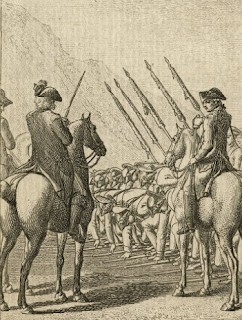On To Blandford - "Scattered Over Three Strong English Miles"

On Sunday, October 26th, the German column of the Convention Army left Great Barrington, Massachusetts . They were probably glad to put the town behind them, given one German officer's comment: "I never saw ruder, more spiteful people..." [1] The next three days would be the most difficult days of their march. On the second day they would reach Blandford, Massachusetts. After leaving Great Barrington on the 26th, one German officer wrote: “We marched in a desolate mountain range… It extends up to Westfield.” These were the Berkshires. The roads, he noted, "were as bad as we had ever seen in America. They were not only very hilly but also stony and rocky and in many places so swampy that the men sank up to their knees.” [2] On the 26th it would turn out that: "We were wrong in cursing the abominable roads, for we found them worse later. The 27th, ... the roads got so bad we had no desire to curse them.” [3] ...


